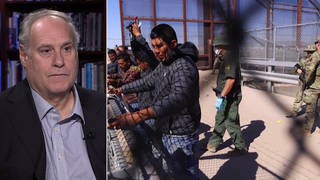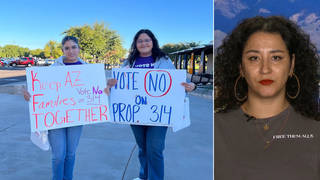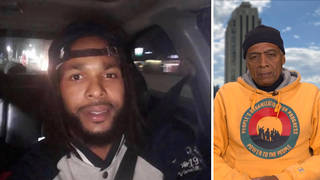
Related
We get an update from New Jersey, where the People’s Organization for Progress is leading a 67-mile march to demand the state Legislature pass legislation to hold police accountable. The nine-day march wraps up Saturday, and activists are demanding passage of a state policy that would give police review boards subpoena power, ban and criminalize chokeholds, establish requirements for use of deadly force and end qualified immunity in New Jersey. At the national level, they are calling for the passage of the George Floyd Justice in Policing Act and the John Lewis Voting Rights Act. “We know that electoral politics alone is not enough,” says Larry Hamm, chair of the People’s Organization for Progress, when asked about his activism following his run for the U.S. Senate this past year. “The primary antidote to police brutality is the organized and mobilized people.”
Transcript
AMY GOODMAN: This is Democracy Now! We end today’s show looking at the ongoing protest that’s taking place in New Jersey. The People’s Organization for Progress, or POP, is leading a 67-mile march to the capital Trenton to demand the New Jersey Legislature pass legislation to hold police accountable. The march began a week ago in Montclair, wraps up Saturday in Trenton.
Joining us now from the side of the road is Larry Hamm, chair of the People’s Organization for Progress. He’s joining us on the road as he heads to Princeton for today’s leg of the protest march.
Can you talk about your demands, Larry?
LARRY HAMM: Good morning, Amy, and thank you for having me on.
Yes, this is the Long March for Justice, the march to Trenton for police accountability, for social justice and economic progress. We’re marching to draw attention to the issue of police brutality. And we want the state Legislature to pass Bill A4656, which is the police review boards with subpoena power bill. We want that bill passed, because that will enable municipalities to have police review boards with subpoena power, which the FOP and the police organizations have been fighting because they don’t want civilian oversight.
We’re marching for an end to voter suppression. We support the John Lewis Voting Rights Act, but we also want same-day registration here in New Jersey.
We’re marching for reparations for African Americans for the enslavement of our ancestors. We’re calling on the Legislature to pass Bill A711, which would establish a reparations commission similar to H.R. 40, the national reparations bill in Congress, which we also support.
And we’re marching for economic progress. We feel that $7.25 federal minimum wage is a slave wage. And we want an immediate doubling of the federal minimum wage to $15 an hour.
And we also want free college for all young people and the abolition of student debt. Those are some of our demands.
AMY GOODMAN: What is the response of the governor, of the Legislature?
LARRY HAMM: Well, it’s not been a great response from the Legislature, because the police review boards bill, which is at the top of our list, has wound its way through the legislative process, was released from committee. The only thing remaining is for the speaker of the Assembly to post it for a vote, and the president of the Senate to post the Senate version, S2963, for a vote. They have refused to do so for months.
After they post it for a vote, it then has to be signed by the governor. Now, this is interesting, because it came up as an issue in the gubernatorial debate that was held just a couple of days ago. And the governor’s response was not the strongest that we anticipated.
And so, this is why we are marching. We’re marching to draw attention to the issue and to put the pressure on the state leadership to pass this bill, because police brutality is a real and serious problem here in the state of New Jersey.
AMY GOODMAN: The role of street protests? Larry, you ran against Cory Booker for the senator in New Jersey, yet you remain now in the streets.
LARRY HAMM: Well, absolutely, because we have to use all the methods that are available to us. Yes, I ran for U.S. Senate and got more than 118,000 votes statewide. And we think that was a good start, and we’re going to build on that.
But we know that electoral politics alone is not enough. In fact, the primary antidote to police brutality is the organized and mobilized people. This is why we have engaged in this 67-mile march through 27 towns over nine days, which will end in Trenton tomorrow. And when this march is over, we will engage in other street activities, including the National Day Against Police Brutality, October 22nd. We’re going to have a rally against Newark with the victims of — with the families of the victims murdered by the police.
AMY GOODMAN: And we will cover that, as well. Larry Hamm, chair of the People’s Organization for Progress, speaking to us from the road in New Jersey.
That does it for our show. A very happy birthday to Democracy Now!'s Juan González. And a happy first birthday to my precious pup Zazu. She blew in on a nor'easter in December, reunited with her beloved twin brother Kasha at four months. And yesterday they came together again to celebrate their first birthday, dancing and prancing in Central Park. Happy birthday, Kasha and Zazu Goodpup.
That does it for our show. Democracy Now! is currently accepting applications for two positions: director of finance and administration and a human resources manager. Learn more and apply at democracynow.org.
Democracy Now! produced with Renée Feltz, Mike Burke, Deena Guzder, Messiah Rhodes, Nermeen Shaikh, María Taracena, Tami Woronoff, Charina Nadura, Sam Alcoff, Tey-Marie Astudillo, John Hamilton, Robby Karran, Hany Massoud. Special thanks to Julie Crosby. I’m Amy Goodman.












Media Options